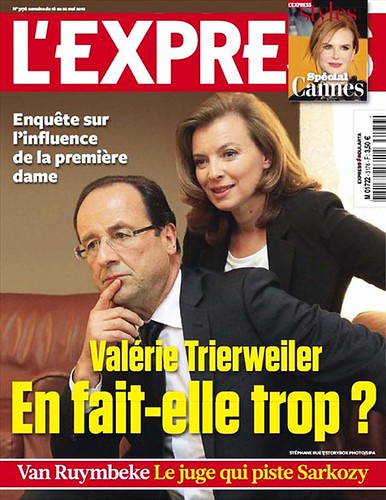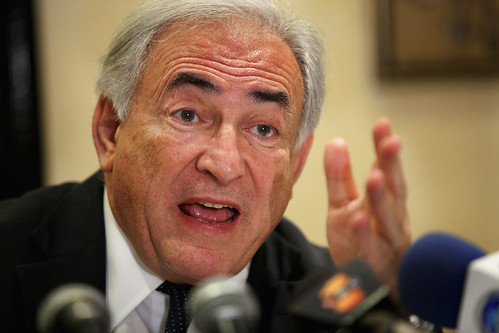
As predicted, Nicolas Sarkozy became the new president of France on Sunday, ushering in what most observers are predicting will be a new era for France. The outcome of this new era, however, is far from certain, and the apprehension in the country is palpable.
The rioting Sunday night in response to Sarkozy’s win was underwhelming by French standards (really, I expect better from the Gauls!). The margin wasn’t razor thin but it definitely wasn’t a landslide either, the 53-47 split being wider than what the polls had showed just after the first round election.
The reaction to the outcome has been interesting. UK press coverage has been more thoughtful, examining the complexities of the election and what it means for Europe as a whole. US coverage has been, on the whole, misleading and inaccurate. A sampling of some of the US headlines for the result on Google News includes,
“Pro-US Sarkozy wins French Presidency” But the idea that this election result had anything to do with the US is a stretch. Though the US media has painted Sarkozy as “pro-US” because of a visit he made to the Bush White House a few years ago, Sarkozy’s win was only made possible because he barely mentioned the US throughout his campaign. In fact it was his supposed friendliness toward the US that was considered one of his biggest vulnerabilities. The little bit that he did mention the US was only to affirm that he would not be a
“US poodle,” a reference to the nickname given to Tony Blair by the Brits because of his sycophancy in the Iraq war.
Actually the US coverage in general (especially in evidence in that first link to the Fredericksburg article) really demonstrates the complete lack of understanding of European politics in the US media. For the US to refer to Sarkozy as “right-wing,” without context is pretty misleading to a US reader considering the European political scale is drastically to the left of its American counterpart and Sarkozy would be a Democrat if he were in the US. But the biggest area in which US media is getting this wrong is in their obsessive naval-gazing. This election had nothing to do with France’s ties to the US, it was about European socialism’s failure to adjust to a changing world in the era of globalization.

The biggest thing one needs to keep in mind with this election result is that the French people wanted to vote for Socialist candidate Royal but felt they needed to vote for conservative candidate Sarkozy. People generally don’t like him as a man, but came to the conclusion that France needed to drastically change course and he was the only candidate offering that change. In fact most French people I’ve talked to about Sarkozy said they would never vote for him for a second term, even if the first term was quite a success. Perhaps it’s a bit like Thatcher in the UK. They need someone tough to break the unions and change the country’s direction toward economic reforms, but once you’re done, get out.
One also needs to keep in mind that the French election didn’t happen in a vacuum and is actually the latest in a
series of centre-right victories in Europe. Just last Thursday the
Labour Party lost control of the Scottish Parliament to the Scottish National Party in local elections there, which wants Scotland to secede from the UK. It’s the first time Labour hasn’t dominated Scotland in fifty years. Last September, Sweden's Social Democrats were voted out of power by a young dynamo promising economic reforms and curbs to the traditionally cherished Scandinavian welfare system. And in 2005
Angela Merkel led the centre-right party of Germany to victory over the Social Democrats in Germany.
The election results in Southern Europe have been the opposite, but they’ve been real squeekers. Zapatero narrowly won a bid to become Prime Minister directly after the Madrid train bombing. Romano Prodi barely won election last year in Italy and his government
nearly collapsed last month because of its razor-thin grip on power.
So what does all this mean? It comes down to idealism versus practicality. Europe is proud of its unique social model and the guarantees European countries can offer each one of their citizens. Europe’s Democratic Socialist triumph over the last 50 years has led to universal healthcare in all countries, generous unemployment benefits, and a quality of life unrivaled in the entire world. In fact in the quality of life rankings that come out every year, the top ten are always European cities, and you don’t start seeing American cities until you get into the 20’s.
All of this progress was made possible by the combination of peace, security and rebuilding that Europe enjoyed following World War II. Strong labour unions were able to negotiate decent wage agreements for workers and protectionist policies ensured that all people were guaranteed a basic standard of living. Because Europe could rely on NATO (aka the United States) for military protection, it was able to spend virtually nothing on its defence budgets, using that money instead to support generous social programs for its citizens.
But two key things have changed. The end of the Cold War means that the US no longer has a vested interest in protecting Europe, and the Iraq War has led many to conclude that the military goals of the US and Europe
may no longer be compatible in the future. This means Europe is going to have to come up with the money to develop a viable standing force capable of self defense. At the same time, the forces of globalisation have dealt a shock blow to the continent’s traditional social system. Heightened competition has meant French workers, for instance, now have to compete with workers all over the world. And why would an employer hire in France, where they have to guarantee workers employment for life and can’t make them work more than 35 hours a week, when they can hire workers in India and China with virtually no restrictions. The basic premise of Democratic Socialism, to produce economic growth that lifts up the poor and the middle class as well as the rich, has now been challenged. And the European left hasn’t found a convincing strategy to address that challenge yet. So Europeans, uneasy about what the future holds for them and wishing to stay competitive in a modern world, are turning to the centre-right for answers.
And the centre-right is providing answers, although it remains to be seen whether they will work. Sarkozy promised that by deregulating the labour market, he could create more growth and more jobs. Royal, on the other hand, seemed to just be advocating the status quo, the maintenance and even expansion of France’s generous social protections.
So what lessons can be drawn from this for American progressives? In a great editorial in the Washington Post today,
E.J. Dionne Jr. says that the American left should think about the frustrations that are making Europeans turn to the right for answers, but not to get carried away trying to draw analogies. He writes:
It would be a mistake to draw too many American lessons from the troubles of European social democrats. For one thing, the social insurance system is much weaker in the United States than in Europe, where even conservatives support substantial government provision for health care and child care. If European voters seem willing to gamble on a bit less security because they have a lot of it, American voters now seem inclined to ask for more because they have so little.
I think this observation is dead on. Sure, in the US there’s still widespread “welfare-bashing,” but it’s mostly stemming from ignorance and sometimes racism. The biggest complaint you hear from the US working class is not that they’re receiving too many social benefits. Some of the biggest complaints of US voters today are about the terrible state of US healthcare, the outsourcing of US jobs and the steady increase in the number of Americans living in poverty. All of these things are the result of the weak (now defunct really) US labor movement and the lack of social protections. So as globalization makes Europe reexamine the generosity of its social system, it may make Americans reexamine the stinginess of theirs. This could create an interesting scenario where the two blocks each move away from their extremes and meet in the center.
Of course, this would be the logical way for people to vote and if Democracy has taught us anything its that people (especially in the US) often don't cast their votes based on well-thought-out logic. But regardless of what happens in the US, one thing is certain. Sunday’s vote is going to drastically reshape the direction of not only France, but of the EU as a whole. And as much as I don’t like Sarkozy, he may be the only one who can revive the stalled EU-building process and move it firmly in the direction of being a viable political union.

















